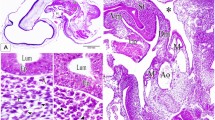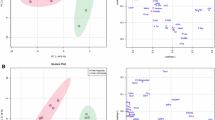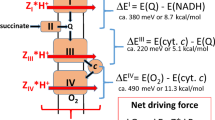Abstract
IN the course of preliminary studies in an investigation regarding the mechanism of the regulation by hormones of enzymic processes, we have carried out determinations of the respiratory quotient (RQ) of the liver tissue with homogeneous material from the frog (Rana temporaria) in the summer state. For each specimen a determination of respiratory quotient was performed on slices by a modification1 of the method of Meyerhof and Schmitt. The values obtained varied between 0·70 and 1·00. When the values of the oxygen consumption per mgm. fresh weight were correlated with the corresponding values of the respiratory quotient, it was found that high values of the latter were accompanied by low oxygen consumptions and vice versa. It follows that different substrates occurring in the liver of the frog are oxidized at different rates.
This is a preview of subscription content, access via your institution
Access options
Subscribe to this journal
Receive 51 print issues and online access
$199.00 per year
only $3.90 per issue
Buy this article
- Purchase on Springer Link
- Instant access to full article PDF
Prices may be subject to local taxes which are calculated during checkout
Similar content being viewed by others
References
Winberg, H., Ark. Zoologi, 32 A, No. 7 (1939). Öhman, L., Ark. Zoologi, 32 A, No. 15 (1940).
Author information
Authors and Affiliations
Rights and permissions
About this article
Cite this article
LINDAHL, P., WERNSTEDT, C. Rates of Oxidation of Different Substrates in the Frog's Liver. Nature 155, 19–20 (1945). https://doi.org/10.1038/155019b0
Issue Date:
DOI: https://doi.org/10.1038/155019b0
Comments
By submitting a comment you agree to abide by our Terms and Community Guidelines. If you find something abusive or that does not comply with our terms or guidelines please flag it as inappropriate.



